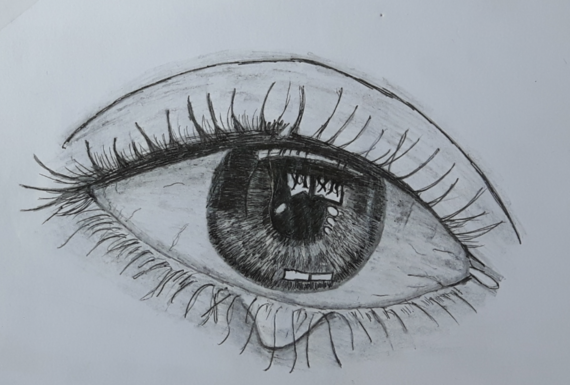by Francis Harrison, ‘Huffington Post’ The Blog, Los Angeles, March 30, 2017
Tired and in shock, he leans on her shoulder as if it were his mother’s. His reddened eyes keep on closing as he nods off, drained by sleepless nights spent reliving the past. Seeing the two of them together – both torture survivors – is a glimpse of intense tenderness, so fragile that I hesitate to frame it in words lest I crush it. There is between these strangers a gentleness, an unspoken all encompassing acceptance, an empathy born of shared suffering. Defining it simply doesn’t do the moment justice.

Everyone in the room knows instinctively that he is not alright today when he arrives from hospital, but nobody asks or intrudes. He’s got his court hearing this week and he’s terrified. He’s also just been told he could loose the sight in one eye if he doesn’t get treatment. He already lost the full use of his arm because of an injury in the war. Fear that he might be going blind before he’s even thirty years old propels him into double despair.
Torture survivors normally recoil from physical contact but the man turns to lean on his other neighbour and there’s no unease; the conversation continues. Their comfort with one another is at odds with what is being discussed by this survivors’ group sitting in a circle in the back of a church far from home.
The refugee counsellor leading the discussion in Tamil finally turns to him and asks how he is feeling. Ever the life and soul of the group, he manages to put on a brave face, fleetingly, and says he’s ok.
“His lips say he’s ok but his face says otherwise,” jokes the motherly lady next to him. She is badly missing her own children.
An older man in the group talks about how important these meetings have been because he made a new friend, indicating the young man struggling to cope today. He’s very subtly reminding him of the value he has in other people’s lives, telling him he matters to him. Later on when we pass round chocolates, they all give him theirs and he hoards them like a naughty child but then meekly gives them all back – the gentle playfulness an alternative to the dark blanket of depression.
Sitting in the group I feel literally weighted down by their loneliness and despair. One man describes having a polythene bag soaked in petrol put over his head in a notorious army torture camp. Another says, yes I was in Joseph camp too. They are skimming the surface of their suffering, lightly alluding to a mountain of hidden cruelty. This is the one place they don’t need to spell it out; they can talk to each other in coded language and understand perfectly. Another person tells the counsellor, “What he just described is my story too”.
The motherly lady says she lives with Tamils but she can never talk to them about what she experienced, even though sometimes they ask when she’s visibly sad. Others say they are angry; one man rolls up his trousers to show us a swollen shin that is causing him so much pain he’s had to remove his shoe while sitting with us.
In the feedback session, a woman who has suffered more than you can imagine, tells the group, “I feel less shame being here, knowing that everyone has – more or less – been through the same thing”. She feels relief but I am gutted. How is it that she still feels shame and not the perpetrators?
Many say they feel better being able to express their feelings directly in their own language with others who’ve also endured torture. But I hear so many people in this one room talk about attempting suicide, about having nothing more to live for, wanting to end it all. It seems they are all hanging on to life by a thread and there’s very little on offer to help them – specialist counselling services are oversubscribed and many spend their days lying on their beds staring at the wall. Most have been attending weekly English classes; we’ve taken a break for a few weeks and they are terrified that the classes will stop altogether. Several say it’s the only day of the week when they eat a hot meal and talk to other people.
In the tea break, a survivor comes to tell me he very nearly jumped under a train on Saturday afternoon after seeing his immigration lawyer. I do my best to reason with him but I know suicide is not defeated by logic. Another torture survivor who tried to kill himself three times explained it to me in a way that I saw for the first time how seductive the idea could be, like the Sirens luring sailors off course to their destruction. He’s in the room too and about to become homeless this weekend. Last time we met I lent him some books and he’s been reading them to improve his English, looking up the difficult words in a dictionary. He fills his empty hours drawing and he brings me his sketchbook. Some drawings I note show metal chains; others a mother and baby. He is keen to show me the very first picture he drew; it is just one sad human eye sketched in pencil in meticulous detail. Perhaps it symbolises both the lonely pain of the horror he has seen from an early age and that he now desperately wants someone to look out for him.
Support a Survivor of Torture is a small UK registered charity started by Frances Harrison, which runs weekly English classes, group therapy sessions, and gives warm clothes to recent torture survivors from Sri Lanka arriving in the UK. Most who come have given testimony to the International Truth and Justice Project.